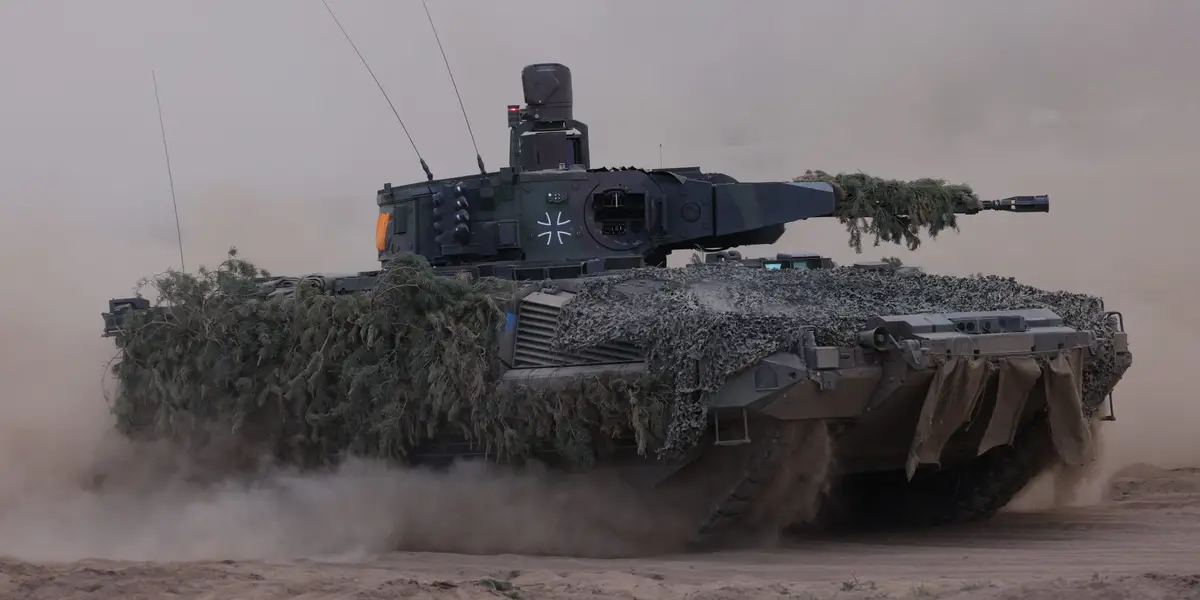
Germany is permanently deploying a combat brigade abroad to NATO’s vulnerable eastern edge for the first time since World War II amid growing concerns about Russian aggression. Unit leadership says it figured out what it needs for war by watching the battles raging in Ukraine.
Commander of the 45th Armored Brigade in Lithuania, Brigadier Gen. Christoph Huber, told Business Insider that the brigade’s aim is to deter Russia and be ready to defend NATO if necessary. It has started operations and will be at full strength — 4,800 troops — by 2027.
Germany had steered clear of major defense actions since World War II, but it changed its approach after Russia’s full-scale invasion of Ukraine. What it’s bringing to Lithuania is informed by watching this war unfold.
“We really have to assess what’s happening right now,” the brigade commander said. “We have to introduce new capabilities in our forces based on the lessons identified in the awful war of aggression by Russia in Ukraine.”
Huber said that it means a mix of newer technology, like drones, and more traditional gear, like air defenses, that have been key for Ukraine, as well as tanks, which have a more mixed record in Ukraine amid emerging threats.
He said a “good mix of capabilities on the ground” is critical for fighting and deterring a “possible war of the future” and sending the message that “here stands NATO, no step further.”
Tanks and armor
Huber said that it is “crucial” for the brigade to employ heavy armor, such as the Leopard 2A8s, the most modern German main battle tanks, and Puma S1 infantry fighting vehicles, as these are core to its commitment. The Leopards have notably been upgraded with added protection against drones.
Huber said the brigade is a top German priority, so “we will see the most modern German military equipment coming into the brigade.”
Though some war watchers have assessed that armored vehicles now lack utility in the age of drones, which can cheaply immobilize expensive combat vehicles, NATO armies still see value in weapons of this nature. Combined with capabilities that Ukraine lacks but the alliance possesses, including advanced combat airpower, these assets could still prove useful.
Not only does the new German brigade intend to field heavy armor, but Lithuania is also betting on armored vehicles, ordering the modern Leopard 2A8 tanks for its own defense.
Related stories
Business Insider tells the innovative stories you want to know
Business Insider tells the innovative stories you want to know
They’re the first tanks Lithuania has bought in its history. Vaidotas Urbelis, the policy director of Lithuania’s defense ministry, previously told Business Insider the purchase decision was made after watching Ukraine and concluding that it showed “the strategic significance of tanks in reclaiming seized territory.”
Huber said the brigade will have other assets like an artillery battalion equipped with the Panzer Howitzer 2000, reconnaissance elements, and armored engineer elements. He said the brigade can then execute “combined maneuver warfare,” a powerful approach to warfare that can be difficult to pull off properly.
Drones and air defenses
Huber said the Russian invasion has shown the brigade that “it is particularly important that we have protection against threats in the air,” be it enemy fighter jets, helicopters, or drones.
“We will really need a lot of air defense assets, in particular for us as an army unit, short-range air defense,” he said. SHORAD is an essential capability needed to protect front-line positions and troops from airborne threats. Systems can include vehicle platforms or man-portable, shoulder-launched systems.
“We will also for sure need reconnaissance drones and attack drones, so-called loitering ammunition,” Huber added, explaining that “all the modern equipment we see used in Ukraine, with all of the elements, are capabilities we will have available in the brigade in the future.”
Drones are being used more in Russia’s invasion of Ukraine than in any other conflict in history, and their quantities have fundamentally reshaped the battlefield. NATO is paying attention.
There’s debate over just how much NATO should invest in drones, but it’s clear they can’t be ignored.
“We are really assessing what is happening,” Huber said, adding that they “are preparing for the war of the future, definitely not for the war of the past, and probably also not for the war which is happening right now.”
Warfare is constantly evolving. He said that preparing for the wars of the past would be “absolutely fatal.”
Protecting NATO
Huber said the brigade’s ultimate goal is to “really be able to make sure that every inch of NATO territory is defended.”
Lithuania, which shares a border with Russia, is seen as particularly vulnerable. Former CIA director David Petraeus said earlier this year that he saw Lithuania as the country most at risk of a Russian invasion, and Russian officials have threatened it.
It spends the second-highest proportion of GDP on defense of all NATO members, and is one of Ukraine’s biggest allies. The country is also building border defenses designed to blunt any Russian attack.
Huber said that the new brigade will be ready to act if needed before it reaches full capacity. “We are not waiting until everything has reached us. I can say that we will contribute right from the beginning to NATO’s deterrence and defense efforts.”
The brigade is also backed by the rest of Germany’s 10th Armored Division, as well as other NATO forces.
Born and raised in south-eastern Germany, Huber watched the Reforger exercises in the 1980s, seeing US troops protecting Germany in case the Soviet Union attacked. They made sure “that I had the possibility to grow up in freedom, to enjoy my life as a young guy,” the general recalled.
Experiences like that, he said, show how “it is really about us as Germans now also giving something back to our eastern allies, and we are doing this here in Lithuania with a huge German commitment.” Even younger German soldiers tell him they feel “we have to give something back,” he said.
“Really, in the end, it is about solidarity,” Huber said. “We, as NATO, stand together; we are stronger together.” People, he said, need to “have their own way of life and that people can choose for themselves and not have Russia choose for them.”



